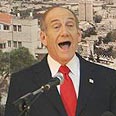
Mother of all cover ups
Despite 3 committees of inquiry, the military is about to fall into a trap set up by the government
An external committee will examine the government's decision making process, but not the outcome of the decisions. An internal military committee will investigate the outcome but not the decisions. And the state comptroller is simply being neutralized. The state comptroller has been sent to look for corruption on the home front. This is going to be the "mother of all cover ups."
They don't really want to know how and why our paratroopers were killed when a building collapsed on them in the village of Dabel. They don't really want to know what happened in Bint Jbeil.
The process by which the prime minister has decided to investigate the war is a direct continuation of the process by which he and his cronies conducted it to begin with.
They don't think, and they don't want us to think that there's any connection between the conduct of the regiment commander in Bint Jbeil, who didn't quite understand what was required of him – when he was told to enter, and then to leave according to cabinet decisions calling him and his troops to enter and then to leave again.
This political pendulum affected regiment 51 in Bint Jbeil, but not exclusively. However, the prime ministry is trying to disconnect the affiliation between the strategic government decisions – two months prior to the war, and throughout its duration – and the tactical results on the ground.
The prime minister decided Monday, that three separate committees would be established to examine the conduct of the government, the military and the home front during the war. As if there were no connection between the three.
The government will be examined by an external committee that will be charged with examining the process in which cabinet decisions were made. However, since this committee does not have the authority to examine the military, it will not be able to examine the outcome of these decisions
on the ground.
Undoubtedly, the external committee will reveal, to its amazement, that throughout the war the government did indeed make decisions and give orders. They may even find several shortcomings during the decision making process, and they may even be worth correcting. However, since the outcome will not be examined, these decisions can't really be taken seriously.
The militarily, on the other hand, is already probing itself and will continue to do so. The deputy chief of staff appointed five or six professional committees charged with drawing systematic, professional conclusions. They will examine the forces' operations and preparedness. The military will examine the findings – but it will not examine the decisions.
Professional conclusions
When "professional conclusions" are drawn, the chief of staff's decisions are not examined. "Professional conclusions" means that the High Command and General Staff will be examined. Even an internal committee appointed by the Defense Ministry will not examine the chief of staff's decision making process.
Rather, it will be involved in systematic matters, pertaining to organizational changes in the military and in other administrative matters.
This separation between examination of the government and military assures one thing: It will ultimately be revealed that those executing the orders, namely the military, had erred.
The military is supposed to examine the outcome of the cabinet's decisions and undoubtedly will find many shortcomings. Some have already been made public and others will follow. Naturally, the military will be in the limelight. The government is not guilty, it only took decisions. The army is about to fall into a trap set up by the cabinet.
The conduct of the defense minister, as may be recalled, does not fall within a military investigation but rather under the authority of an external committee charged with examining the government's decision making process.
Neutralizing the state comptroller
And the worst of it is that the state comptroller will examine the conduct of the home front. This is a classical way of neutralizing the state comptroller from other sectors.
Heaven forbid he should be involved in the government's decision making process and mode of operation. Heaven forbid he should examine the military.
Let him examine the bomb shelters, and the emergency authorities. Let him look for corruption. Let him examine where the mayor of Safed disappeared to during the war and under what terms Yossi Kutchic was employed to run the city, just as long as he isn't involved in serious matters.
But can the state comptroller examine the military intelligence's evaluation which led to the home front's lack of preparedness? This is a subject that "transcends organizations," and it is not the only one.
The home front, in a state of emergency falls within the responsibility of the defense ministry and the IDF. Will the state comptroller get that far, or will he suffice with pointing an accusing finger at the Home Front Command chief, holding him solely responsible for the home front's failure.
No one will examine national priorities: Not how the budgets were distributed nor where the emphasis was placed when building the military force. Nor will anyone examine the decisions taken by the Finance and Defense Ministries regarding national and budgetary priorities.
No one will examine which civilian institutions were supposed to oversee the military, and what they had been doing for the last four years. And no one will examine why there was no warning system and why the rocket fire wasn't thwarted. And no one will be appointed to examine the cabinet's part in preparing the military in the past four years.
Someone is seriously mocking us.










